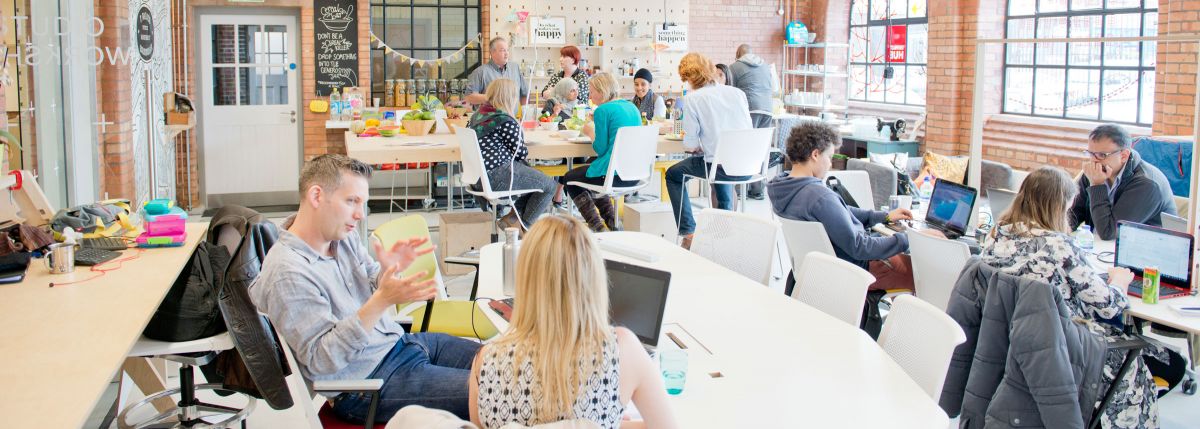Social investment is no fairy tale, but you might need to kiss a few frogs before you get the right deal.
As a young organisation at Impact Hub Birmingham, we have a pretty good understanding of new models of funding and emerging ways of raising finance. The initial funding to set up our space in Digbeth, Birmingham was raised through a combination of the city’s biggest social crowdfunder and grant investment from the Barrow Cadbury Foundation. But before we could even get going on the #epicbrum Kickstarter, we needed to raise a significant sum to cover the rent deposit for the building we had found. The combination of trading history or track-record and a general nervousness around the project from the city’s organisations meant we had to turn to a private source of finance. Expensive, risky and certainly not ideally aligned with our values, but without taking this initial risk we would never have been able to secure the space which is now a bustling, vibrant community of changemakers looking to build a better Birmingham.
Unfortunately, at this point, Good Finance wasn’t available and so we jumped straight into an application with one funder without really considering alternatives or whether their type of finance product would be the most appropriate for us
After our first year of trading, this debt was due to be paid back and the repayments were starting to eat into our working capital and money we needed to grow our service offer. With a few potential contracts in the offering, a viable income stream (and plans to grow this) plus a few conversations we had had with social investment providers, it felt like now was the time to take the plunge into the world of social investment.
Unfortunately, at this point, Good Finance wasn’t available and so we jumped straight into an application with one funder without really considering alternatives or whether their type of finance product would be the most appropriate for us. They were saying all the right things and we were confident a deal could be done. It all seemed to be going well, but after quite a lot of back and forth, and back and forth and back and forth of spreadsheets, we were told the proposal would be put to the investment committee. And it was at this point we were asked about what our back up options were. We had not properly considered this. Putting all your eggs in one basket was a big mistake as it turns out.
Six months of work, which took me away from the important day-to-day work of trying to keep a new business going. Six months of confidence building and ‘just one more thing on your cash flow projections’, six months of paying back another more expensive loan, we were then told we weren’t suitable for a new loan from them.
This was pretty crushing. Partly because of the work that we put in, but mainly because we knew that if we're to grow and refocus our efforts on productive work, this matter would need sorting. It also hit home that whilst there is a lot of fanfare around social investment and positive stories out there, it turns out that not all providers of capital are the same and some are just not suited to the types of risk the sector needs. This is the biggest misnomer of social investment, the approach is the investment first and is not linked to the risk of a small socially focused organisation not being able to do their work with more emphasis towards the risk of default of a large organisation.

As an organisation for whom the world of social media and honest communication has been integral to our story, this is where we turned next. Sharing our story and calling out some of the myths of social investment. This approach brought in offers of help and guidance on where to go next. Much of the information which is now available on Good Finance (we wish it had been available then) came in from various sources. And from this, we were able to work with Big Issue Invest who took a more hands-on, more face to face and less spreadsheet focused approach. They were able to invest in us through their Impact Loans England Fund which is part of the Access Foundation's Growth Fund. This blended capital is especially focused towards smaller organisations and shortly after we were able to secure the finance we needed to focus on the projects and contracts that the previous social lender was unable to include in our financial projections. The work has grown and so has the organisation, jobs have been secured and a brighter future beckons because of this investment.
At the moment, the social investment world shares many similarities with the traditional financial sector, but with more socially motivated sources of money and individuals who care about the impact you’re creating in addition to the return potential
But without a doubt, there are ways in which the social investment world could be improved, just as there are numerous ways the general financial systems need to change. Whilst this is still the case, information on providers, their appetites to risk and style of funding is essential. Warm words are great, but they don’t pay the rent.
By Andy Reeve, Co-Founder, Director of Finance & Urban Economics, Impact Hub Birmingham
Editors note: blog content often comes from independent voices and do not necessarily represent the views of Good Finance. We view this as an open forum for discussion and welcome a diverse range of opinions and perspectives on social investment. Would you like to contribute? Contact us here for more information.
